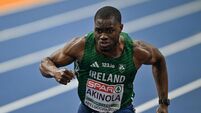Tommy Martin: Can we still say we’re truly rugby country?

One of the strengths that Niall Quinn brings to his new role as FAI Interim Deputy Thingummyjig is that he reminds many people of one of the happiest moments of their lives.
There are very few people you meet in everyday life about whom you can say that, unless you happen to be married to one of them, and even then there’s no guarantees.














